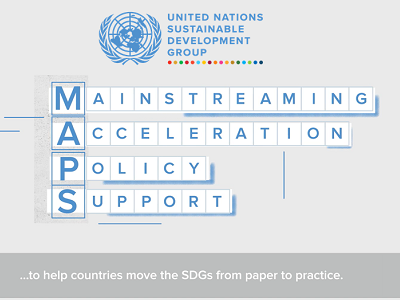What's the MAPS approach?
The 2030 Agenda for Sustainable Development speaks to the core mandate and values of the UN system, including promoting and encouraging respect for human rights for all. UN entities are brokering relevant knowledge and technical assistance on sustainable development challenges, opportunities and solutions with the aim of advancing progress on the Sustainable Development Goals (SDGs). The United Nations Sustainable Development Group’s joint Mainstreaming, Acceleration and Policy Support (MAPS) approach provides an umbrella framework for such support (with data, accountability and partnerships as supporting pillars) to enable UN country teams and Resident Coordinators to better support governments in delivering on the 2030 Agenda and the SDGs.
This e-learning course on MAPS for the 2030 Agenda is a joint initiative between the United Nations Development Programme (UNDP) and the United Nation’s Children’s Fund (UNICEF), together with the International Labour Organization (ILO). The course has been developed under the UN Sustainable Development Group’s Task Team on Integrated Policy Support, and aims to equip policy practitioners with a common understanding of the MAPS approach. The course is open to staff members and partners of the United Nations with an interest in learning about how countries can accelerate efforts to achieve the SDGs through coherent and integrated policy efforts.
What's an SDG Accelerator?
An SDG accelerator is a “leverage point” or a “critical pathway” within a development system, which when positively influenced, can lead to accelerated progress and transformational change in the state of the system. Accelerators have interlinkages across economic, social and environmental domains in a development setting. Interventions in these accelerator domains can unleash rapid progress across different SDGs and targets at the same time.
Who should take this course?
Experts from across the UN development system, at the headquarters, regional and country levels, who are involved in country-level integrated SDG support, including through MAPS engagements, UN Sustainable Development Cooperation Frameworks or Joint SDG Fund initiatives.
What are the learning objectives?
After completing this course, participants will be able to:
- Explain the MAPS approach and how it is applied.
- Plan and implement a MAPS engagement.
- Deploy core tools and approaches to SDG mainstreaming, acceleration and policy support.
How long will the course take to complete?
This course is self-guided and has no time or date limit for completion of all course components.
These are the time estimates for completing each major course component:
Level 1: MAPS Team Member Certificate [~3 hrs to complete]
- To achieve a MAPS Team Member Certificate, course-takers must complete the introduction section to the course which includes “The MAPS Journey” and “Technical Package 1: Using the MAPS Approach to Provide Integrated Policy Support for the SDGs”.
- This minimum training level will be required for participation in a MAPS mission.
Level 2: MAPS Qualification Badges [~2 hrs per Badge, ~9 hours for all six badges]
- Individual MAPS Qualification Badges will be awarded for successful completion of Technical Packages 2 through 7 covering various mainstreaming, acceleration and policy support capacities (see course structure below).
Level 3: MAPS Expert Certificate [~12 hours]
- A MAPS Expert Certificate will be awarded for successful completion of Level 1 and all MAPS Qualification Badges.
Structure
Introduction
- The MAPS Journey
- Technical Package 1: Using the MAPS Approach to Provide Integrated Policy Support for the SDGs
Mainstreaming
- Technical Package 2: Leaving No One Behind
- Technical Package 3: Assessing SDG Alignment
Acceleration
- Technical Package 4: Identifying SDG Accelerators
Policy Support
- Technical Package 5: Data and Metrics for Tailoring the SDGs to National Contexts and Reporting Progress
- Technical Package 6: SDG Financing
- Technical Package 7: Enabling SDG Coherence and Coordination
Contact details
For more information, please contact the interagency MAPS project team at ippn@sparkblue.org and/or Maricar Garde (mgarde@unicef.org)
